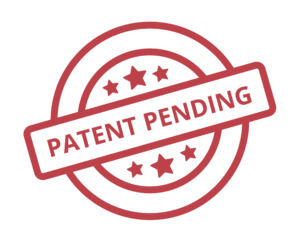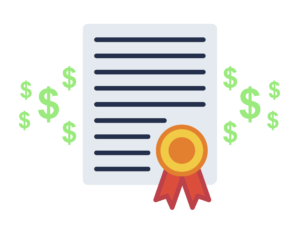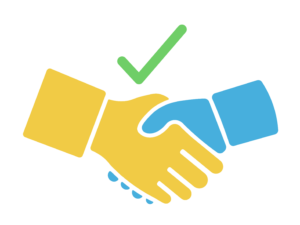There are many advantages to filing for and owning a patent. Everyone knows that patents can be used to protect intellectual property, but how else can owning a patent benefit you? There are a few hidden benefits to patents that many people don’t talk about. Did you know it could be worthwhile to file a patent application even if you do not ever plan on using the patent yourself? Patents are so valuable that many applicants choose to file for them just to use them as a business tool or a method of blocking competition. Patents are one of the most versatile tools in the entire business world. Therefore, it’s important to understand all the different ways they can benefit you.
Protecting Intellectual Property 
As mentioned above, the most obvious benefit of patents is their ability to protect your intellectual property. When used as they are intended to be used, patents allow their owner(s) to prohibit anyone else from making, using, or selling their patented intellectual property. This means the owner(s) have the right to take legal action against anyone who infringes on their patented intellectual property. This benefit is most important for those who want to start a business around their intellectual property. If you plan to use your patent, you must understand how your patent rights work.
Once an inventor earns a patent, they can use it to prevent others from making, using, or selling anything similar to their patented intellectual property. However, owning a patent does not automatically prohibit others from infringing on your intellectual property. Instead, patents provide you “offensive” rights, which can be used to take action once someone infringes on your patented intellectual property. Owning a patent provides you the right to notify any infringing entities that they must cease and desist. If the infringement persists, you also have the right to sue them for patent infringement.
Patent Pending 
There are some inadvertent, but important benefits that you obtain just by filing a patent application. Most people have heard of the phrase “patent pending”, but what does that mean? Essentially anyone who files a patent application is allowed to publicly attach the label “patent pending” to the product or process that they are attempting to patent. The “patent pending” label does not provide any immediate power to the patent applicant. However, it can be used to warn infringing entities ahead of time that they should cease and desist or negotiate a licensing deal. This can help you scare off competition that is debating entering your market or negotiate a partnership with them.
Most businesses are not willing to mess with patent pending intellectual property. Anyone that copies patent pending intellectual property is playing a very dangerous game. If someone were to copy your patent pending intellectual property, one of two things would happen. If you are granted the patent for your intellectual property, you will be able to sue any infringing competition. This usually requires the infringing party to pay a large sum of money and forfeit or modify their business. If you are not granted the patent, unfortunately, there is nothing you can do to prevent the competition from copying your intellectual property. The risk of a lawsuit if your patent is granted is not something most businesses are willing to chance. Therefore, the “patent pending” label can be very effective for driving off potential competition or opening a conversion about partnership.
Licensing and Resale 
The costs of starting and running a business can be immense. A new business often has to worry about branding, building a website, producing a product, finding a manufacturer, marketing, etc. All of these things can make the business world impractical, scary, and uninviting for many people. However, that does not mean that you can’t capitalize on your intellectual property. Did you know that you can license or sell a patent? This means you can profit from your intellectual property without ever having to create a business around it. You can avoid all of those costly start-up fees and jump right into making money off of your patent. This is arguably the most important benefit of patents. Most people don’t realize owning a patent gives you the power to choose your own path.
Patent ownership works similarly to owning property. The owner of a patent always has the option to use the patent, but they also have the option to sell the patent just like they would with personal property. Selling a patent can help you avoid all of the costs and stress that come with running your own business. However, more often than not, if a patent you own can be easily sold, it would be more beneficial for you to license it. Licensing allows you to charge multiple entities for the rights to make, use, and/or sell your patented intellectual property. Licensing is another great option for an inventor that does not have the resources or time to start a company on their own. By licensing your patent, you can create multiple revenue streams without having to worry about producing or selling your intellectual property. When executed properly, licensing can be a consistent and lucrative business venture that yields profits very quickly. Once you develop the skills to draft and file patent applications on your own, you can produce, sell, and license as many patents as you would like.
Blocking Competition 
While patents are most commonly used to capitalize on their financial potential, there is another side of the patent world where businesses use them to block competition. This advantage of patents is more commonly used by large companies that have the money to spend on patents that they never intend to use or sell. However, small businesses and everyday inventors can use patents to block competition as well. If you create intellectual property with promising earning potential, it can be beneficial to file multiple patent applications that include variations of your intellectual property. This will help you prevent anyone from entering your market and allow you to capitalize on your intellectual property without interruption.
While this method is not necessarily intended to be used for financial gain, there is still a chance it can have that result. Any patents that you earn to block competitors can still be used to sue infringers. Therefore, any competitors smart enough to check if you have patented your intellectual property will most likely avoid your market. Any competitors that enter your market and fail to check if you have patented your intellectual property will likely be liable for infringement. Using patents to block competition is an advanced tactic in the patent world. Make sure that you weigh the pros and cons of this strategy before making any final decisions.
Establishing Legitimacy 
While there are several ways to leverage patents as a financial business tool, patents can also provide a more personal benefit. Patents inherently convey a sense of legitimacy, business acumen, and intelligence. If you are a professional in a reputation-based industry, owning a patent can help you stand out from the rest of the crowd. In a world where people often make business decisions based on resumes and short interviews, owning a patent will immediately elevate you above your competition.
While anyone can acquire a patent, not many people can say they own one. Patents are a talking point, and they show you have the dedication and resilience to navigate the difficult patenting process. Anyone who has experienced the patenting process will tell you that it can be challenging. This makes owning a patent a very impressive accomplishment. If you find yourself in need of a guaranteed reputation builder that can help you make advancements in your career, business relationships, and personal life, you should look into patents.





